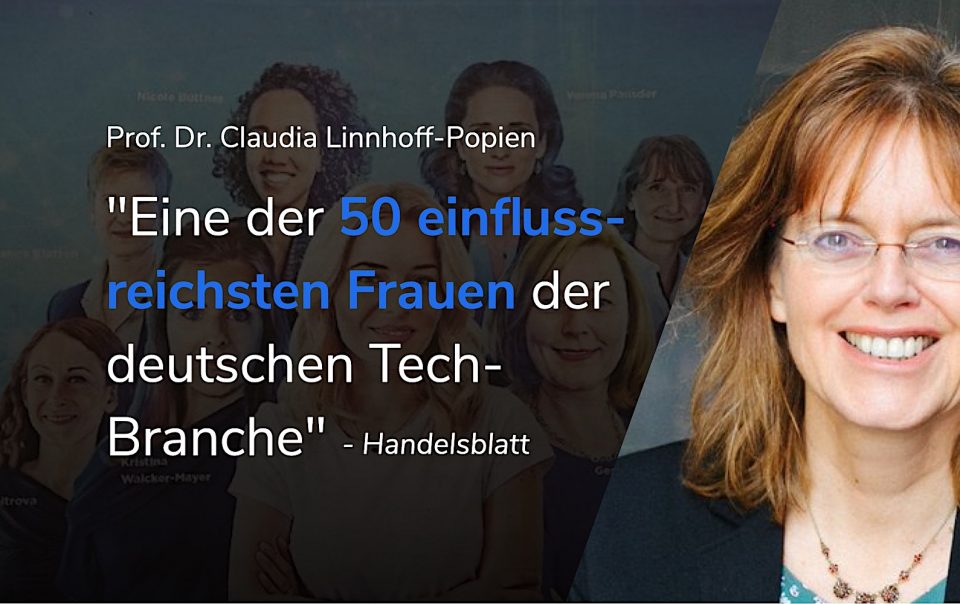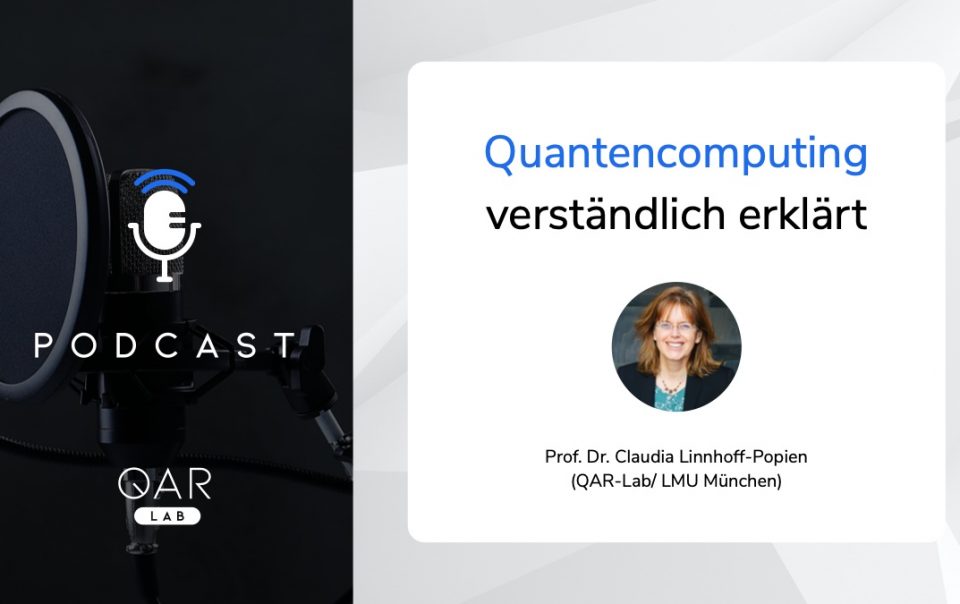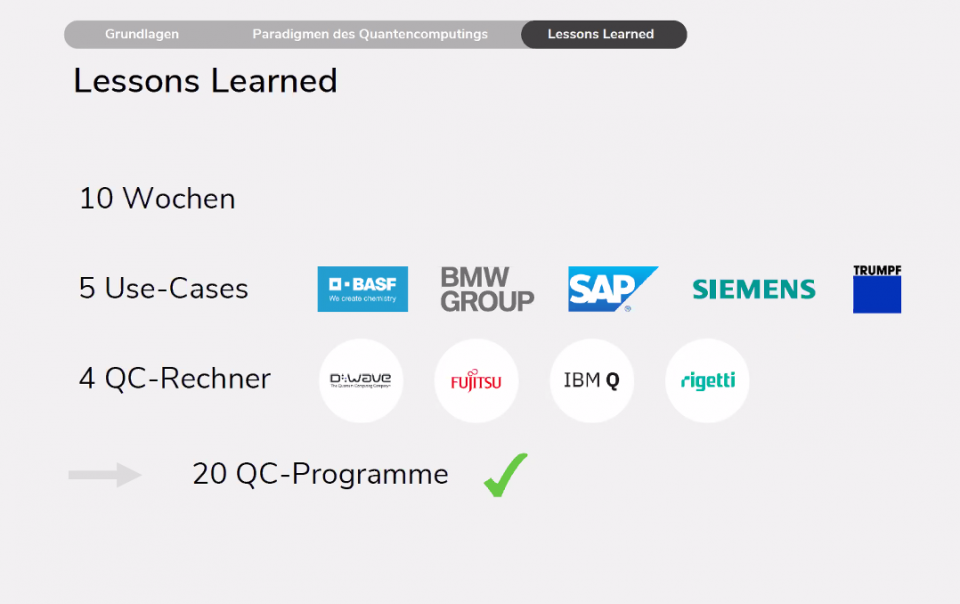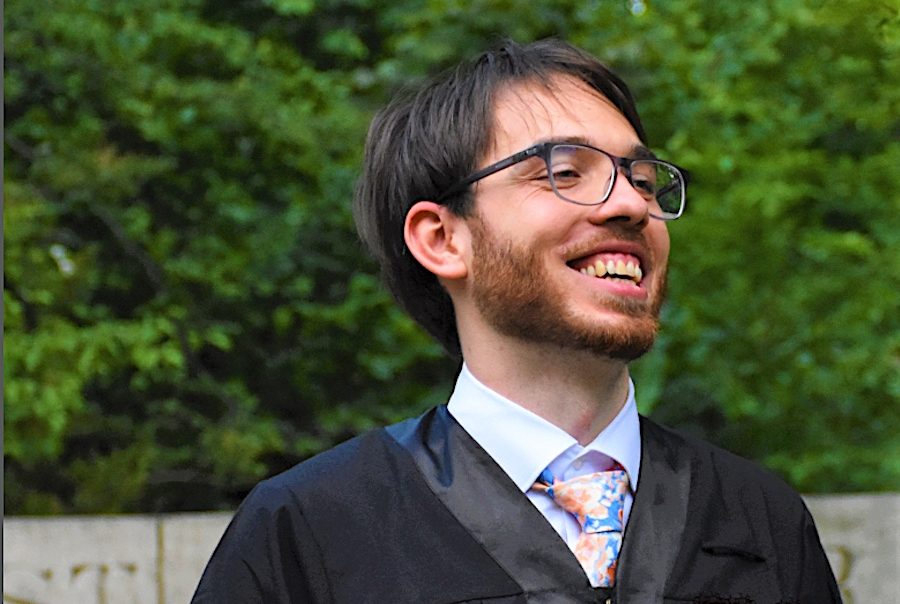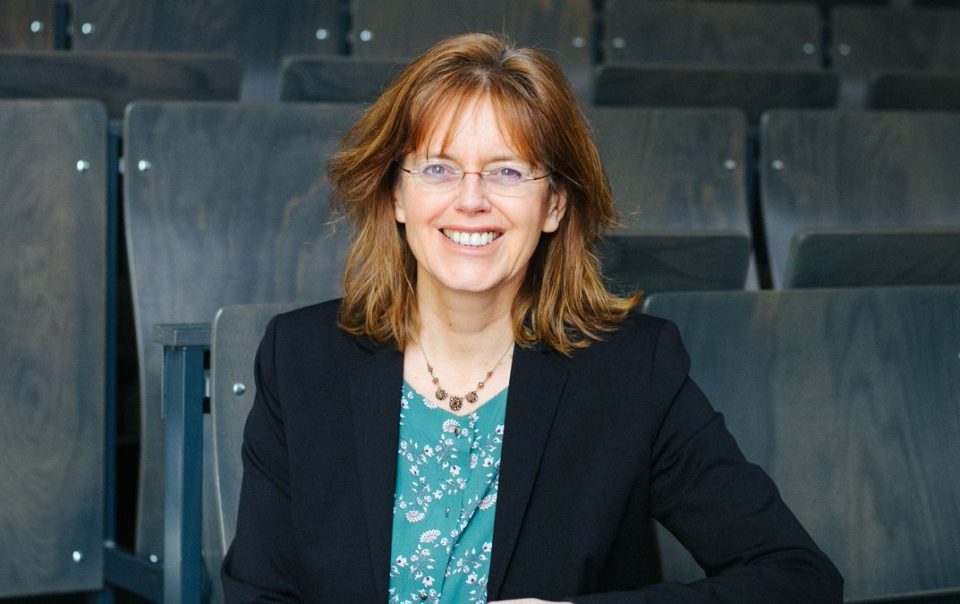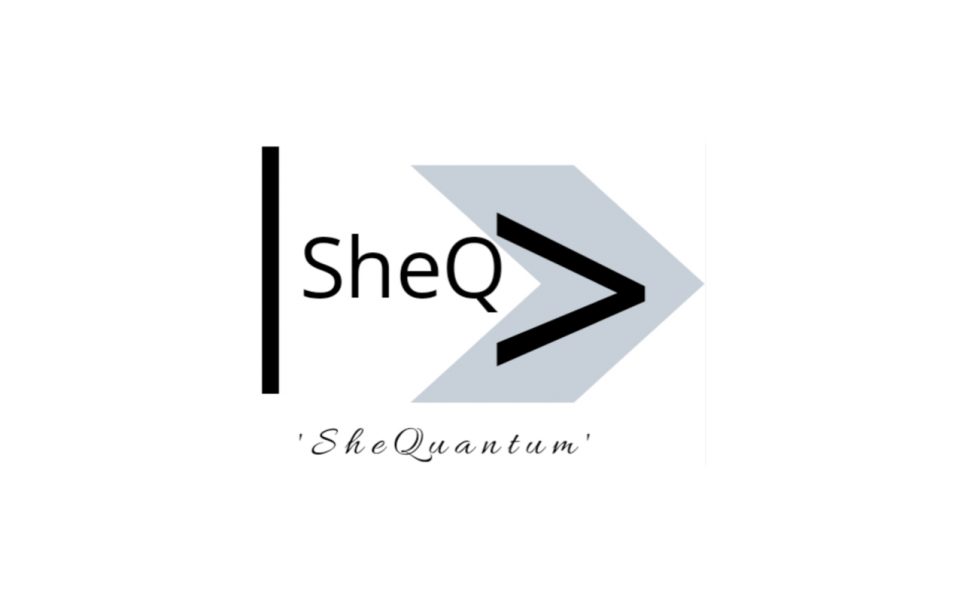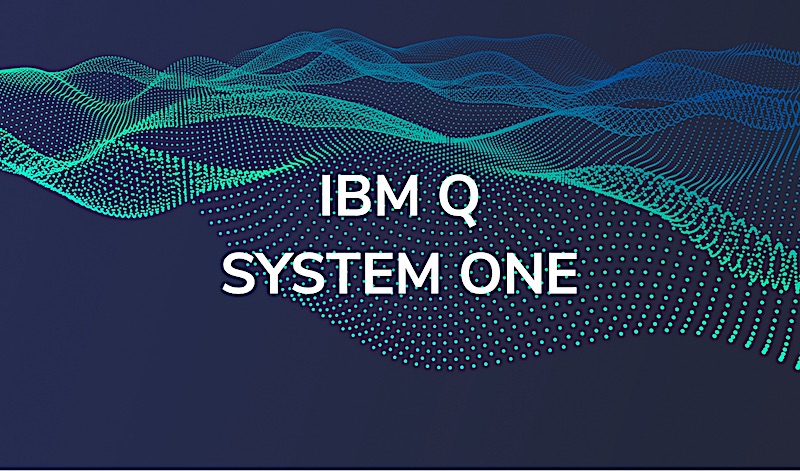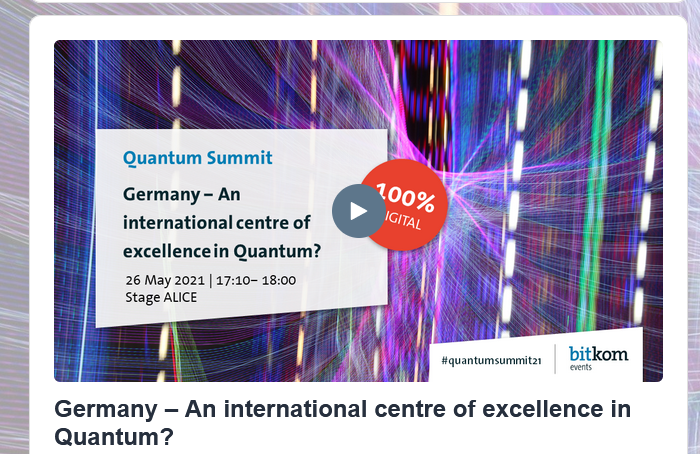QAR-Lab-EN
Prof. Linnhoff-Popien titled as "One of the 50 most influential women in German Tech industry“
(Aug. 6, 2021) The German newspaper “Handelsblatt” has titled Prof. Dr. Claudia Linnhoff-Popien as “One of the 50 most influential women in the German tech industry“, naming her in position No. 6.
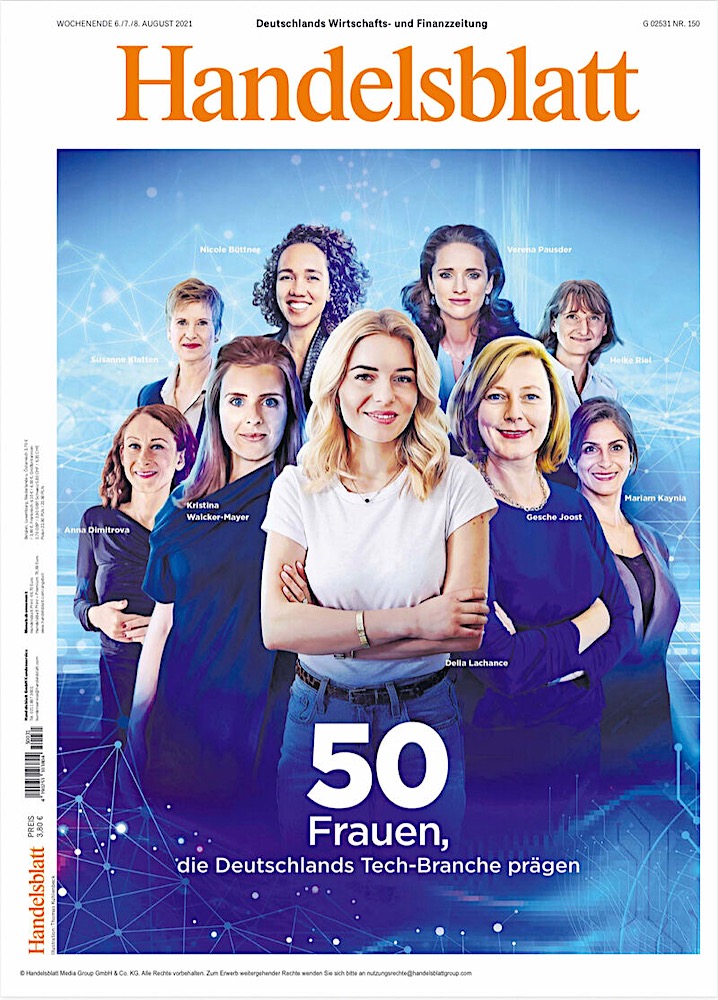
Front page of Handelsblatt, Aug. 6, 2021. © Handelsblatt
The holder of the Chair of Mobile and Distributed Systems teaches and conducts research at Ludwig-Maximilians-University LMU Munich. There, she also heads the Quantum Applications & Research Laboratory (QAR-Lab) since 2016, which is currently the only institution in the world that works on four real quantum computers.
In 2020, the computer scientist had advised the German government on the joint national strategy for quantum computing as a member of the „Expert Council for Quantum Computing“. As a result, the expert panel had handed over the national “Roadmap Quantum Computing” in Berlin in January 2021. Linnhoff-Popien had contributed significant findings on the part of computer science to the application of quantum computing.
The title from the business newspaper reached Claudia Linnhoff-Popien shortly before her vacation. She said she was very pleased and intends to continue to work hard in Germany to ensure that companies soon enter the field of quantum computing.
Prof. Linnhoff-Popien in the podcast about "Quantencomputing verständlich erklärt"
(09.08.2021) Prof. Dr. Claudia Linnhoff-Popien talks in a podcast about how companies in Germany can get started with quantum computing. She sheds light on how companies can achieve an early quantum advantage and what the future of quantum computing promises. Prof. Linnhoff-Popien was invited to the interview by Bayern Innovativ.
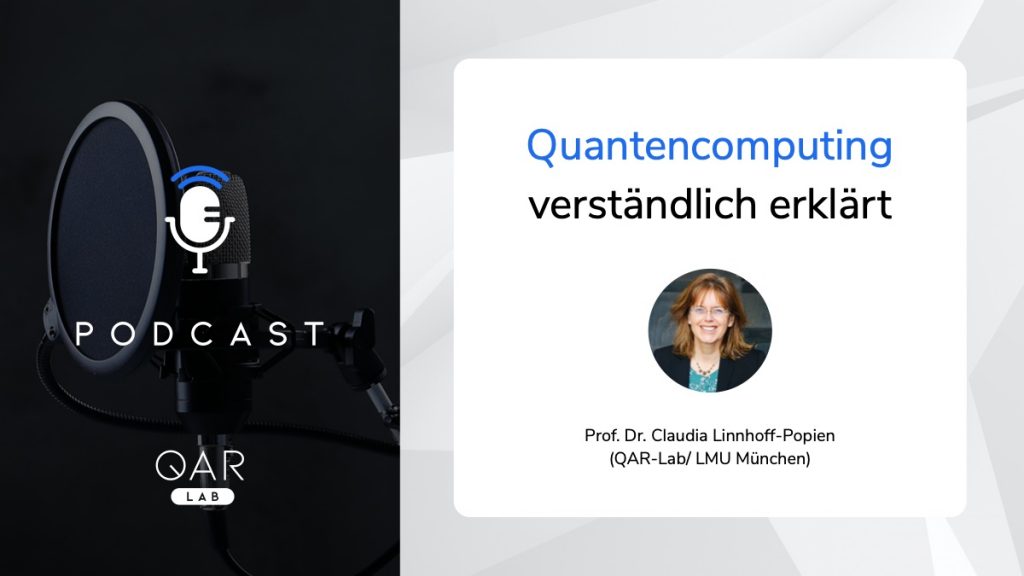
Preview of the podcast (german language):
One quote (translated from german) from the podcast episode:
Prof. Linnhoff-Popien: […] We focus on helping companies achieve a quantum advantage as quickly as possible. To get the company started first, we have a procedure of six different levels to start a migration. In Level 0 and 1, the company is considering whether it wants to use quantum computing and is getting into it. At level 2, things get interesting. Here we talk about a longlist – we look together with the company at typical cases that allow a quick start with quantum computing. […]
Listen to the entire podcast episode (german language) for free:
QAR-Lab presents results of the "Quantum Computing Optimization Challenge" with BASF, BMW, SAP, Siemens and Trumpf
(July 26, 2021/Munich) After a three-month programming challenge of the Quantum Applications & Research Lab (QAR-Lab) with five use cases of big German corporations on four quantum computers each, one of the most extensive European tests of the worldwide existing quantum technology ended in July.
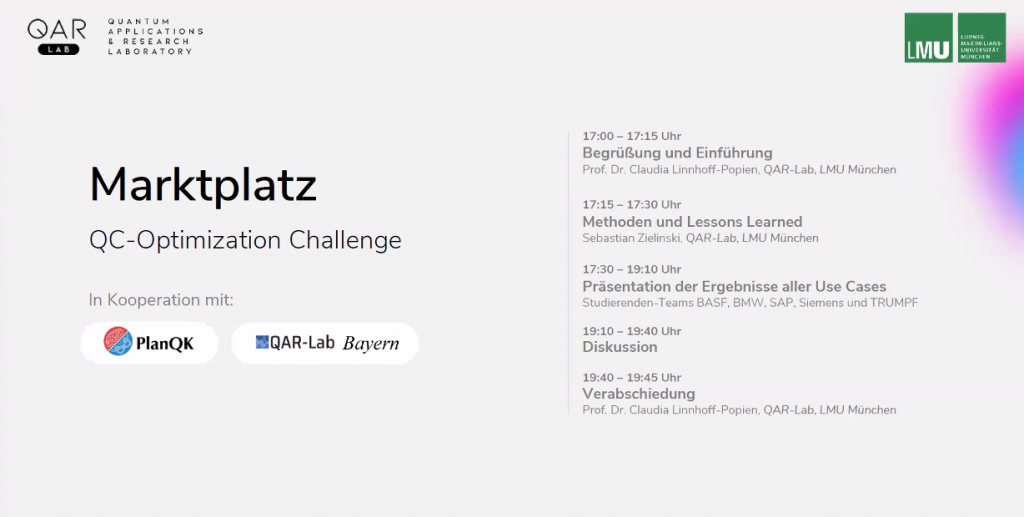
Under the lead of Prof. Dr. Claudia Linnhoff-Popien and her research team of the QAR-Lab, 27 students calculated real use cases from the companies BASF, BMW, SAP, Siemens and Trumpf on quantum computers. Each use case was programmed on four computers to achieve the optimal result in each case. The computers used were:
In the three-hour final presentation, participants presented their results obtained in these 20 constellations. The closed event had 50 participants.
Chair holder Claudia Linnhoff-Popien reported on the complex framework conditions that the QAR Lab had to resolve beforehand, in order to enable LMU students to use various real quantum computers. With costs of 41,000 Euros, a long legal run-up, and a challenging familiarization on the part of the scientific supervisors with the use of these computers, this had been the most elaborate practical course in the history of the chair. Claudia Linnhoff-Popien was pleased: “No one in Germany offers students such opportunities to experience quantum computing. We are at the forefront worldwide – I am very proud of that.”
Founded in 2016, the QAR-Lab aims to make quantum computing accessible to a wide range of users in research and industry at a low threshold. It is continuously dedicated to new projects that build a bridge between science and industry.
Over the course of „Quantum Computing Optimization Challenge“ project, researchers gained different insights, with particular emphasis on performance, noise, and user experience findings when accessing the quantum computing hardware used. A detailed comparison of the results depending on the use case took place and forecasts were made for the development of the respective systems. With the four computers used, a broad coverage of the currently available quantum hardware was achieved, even across architectures with gate-model and annealing-based computers.
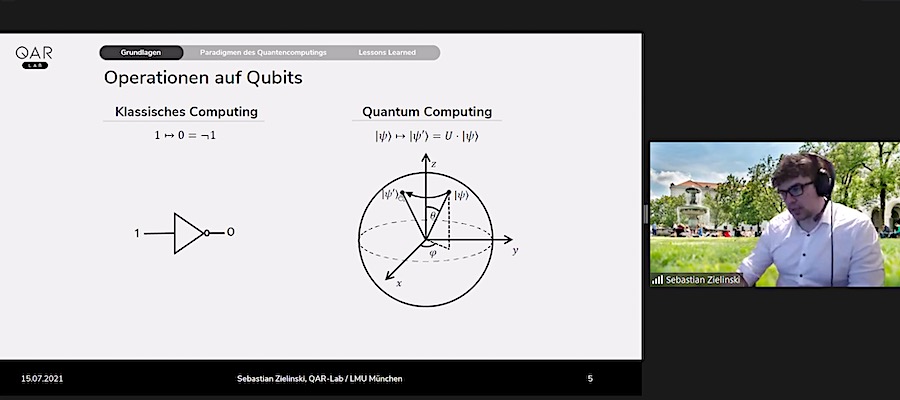
Presentation of “Methods and Lessons Learned” during the closing event of the QC-Challenge by Sebastian Zielinski
Initial findings of the programming challenge were: Small instances of real-world industrial use cases can already be solved using quantum computers.
However, the quality of the solutions obtained depends on numerous factors. All quantum computer solution methods have a large number of parameters, the setting of which has a great influence on the solution finding. However, finding the ideal parameter values is time-consuming and cost-intensive due to a lack of empirical values. The response times are also subject to large fluctuations. Depending on the time of day, the utilization of the machines and thus the response time of the quantum computers varies. A period of time ranging from a few seconds to numerous hours can pass before one receives a response from a quantum computer.
Due to a lack of standardization in hardware access, the various groups had to familiarize themselves with the respective proprietary software development kits (SDK) of the different quantum computers. As a result, problems arising at different points had to be solved individually. The last finding provides a starting point for own basic research in the area of standardization of access technologies or for software tools that abstract a certain complexity when solving use cases with quantum computers and thus simplify the solution finding process.
Experts from the QAR Lab are optimistic that the economy will have a quantum advantage in five to ten years. Then quantum computers will solve tasks that are completely impossible with conventional computers or will be able to do so immensely faster and for greater complexity.
The conclusion of the challenge
In a few years, when quantum technology has the necessary power to solve real industrial problems, tools and algorithms developed by the QAR Lab, as well as practical trained experts, will already be prepared. With their know-how, they will enable industry to use quantum computing immediately. Besides this, the QAR-Lab already makes an immense contribution in the training of future quantum computing experts through such practically relevant events.
Dr. Thomas Gabor successfully defends his doctoral thesis
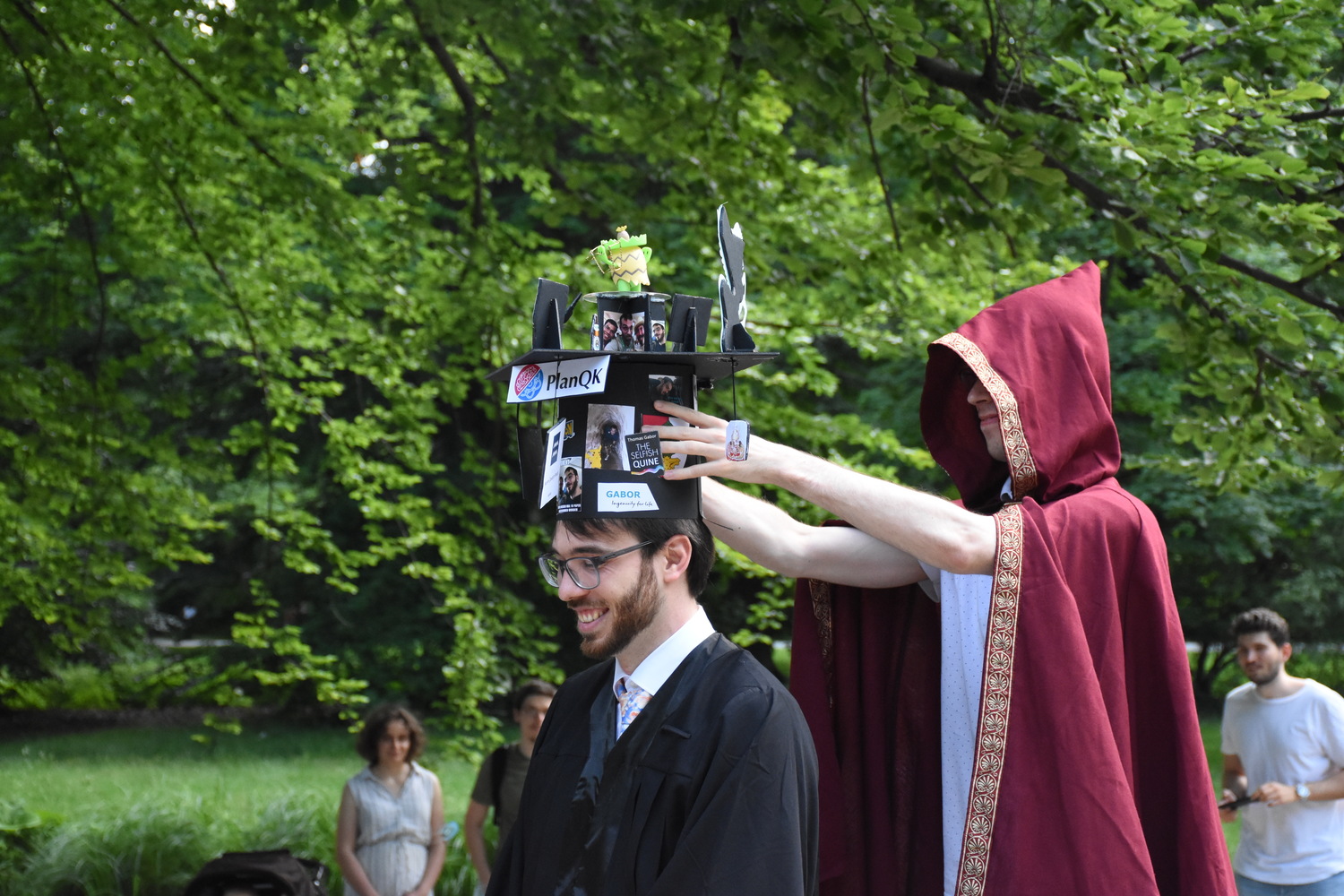
Photo: Andreas Sedlmeier
Dr. Thomas Gabor successfully defended his doctoral thesis on “Self-Adaptive Fitness in Evolutionary Processes” on July 06, 2021. Congratulations!!!
Prof. Linnhoff-Popien interviewed by LMU: "The age of quantum computing has just begun"
Claudia Linnhoff-Popien is testing various quantum computers to identify those most suitable for tackling commercial optimization problems.
The challenge you have posed is not breaking the current record for sailing solo around the world or winning the Trans-Sahara Rally. You are interested in classical optimization problems that arise in manufacturing and logistics. Nevertheless, the competition your students are now involved in does have some rather special features. What’s it all about?
Linnhoff-Popien: The task set by the Quantum Computing Optimization Challenge is to identify areas in logistics and production in which early implementations of quantum computing offer advantages over conventional computers. The range of possible applications for quantum computing is immense, but we are concentrating on optimization problems. We expect that a quantum advantage in this field can be demonstrated within five years. The term ‘quantum advantage’ is applied to tasks that that can be performed by quantum computers, but are either intractable for, or can only be carried out less efficiently or in less demanding contexts by conventional computers. We are already preparing our informatics students for the coming era of the quantum advantage.
In the Challenge, we will ask four of the best quantum computers currently available to solve a set of realistic optimization problems supplied by our commercial partners BASF, BMW, SAP, Siemens and Trumpf. Our students, and the researchers in our QAR Lab who supervise them, will use IBM’s Q System One, the Rigetti Aspen-9, the D-Wave Advantage and the Fujitsu DAU for this purpose.
What sort of tasks are your students confronted with?
Linnhoff-Popien: The Challenge involves problems that are of practical relevance to our commercial partners. For example, what is the optimal route for the delivery of goods to a particular set of customers, or in what sequence should a robot remove test tubes from a rack, analyze their contents and replace them. In other cases, the problem relates to the optimal use of space, where any given object should be placed in relation to others. For example, in what sequence should a set of engine components be assembled so as to minimize the total number of tests required. In the factories of the future, in which assembly lines have been replaced by robots that deliver the components in a predetermined order, process scheduling is vital, so the optimal sequence of steps in the assembly process must be defined.
Can’t all this be done on conventional computers?
Linnhoff-Popien: Yes, but it can be done efficiently only for relatively small numbers of variables. Let’s take the problem of the combinatorial optimization of gate allocation at Munich’s Airport. For a terminal with 250 aircraft and 50 gates, a classical computer takes all night to optimize the allocation plan for the next day. It sounds like a simple problem. After all, a classical computer can evaluate every possible combination of allocations of aircraft to gates, and calculate the optimal one. But the space of possibilities rapidly explodes – and the high degree of complexity is pushing a classical computer to its limits.
You refer to generic quantum computers. But you have access to several different types.
Linnhoff-Popien: Yes, there are various technological implementations available. Let’s look first at quantum annealing. The typical representative of this ‘hybrid technology’ is the model developed by D-Wave Systems in Vancouver. This machine makes use of quantum superposition to solve optimization problems, but it must be cooled to cryogenic temperatures close to absolute zero. – That’s why the computer takes up as much space as a garage.
In contrast, the Japanese company Fujitsu uses a process called digital annealing. Strictly speaking, this is not really a quantum computer, but it doesn’t need cooling.
Linnhoff-Popien: What are called ‘gate-model’ computers, such as those that have been developed by Google, IBM, Rigetti and others, use what is regarded as a highly promising technology. However, it must be admitted that, at the moment, we are still at the stage of the NISQ-based computer, which depends on noisy, intermediate-scale quantum technology. These computers generate lots of noise, which must be filtered out in order to get the best result. What we need is a self-correcting quantum computer, but this will take time to develop. Since nobody can predict what kinds of developmental breakthroughs the future may hold, we are looking at the best available quantum computing technologies worldwide in parallel. As I mentioned, we currently have contracts for computers built by D-Wave, Fujitsu, Rigetti and IBM.
But even representatives of leading firms in the field admit that, in their present state, these computers have no industrial relevance.
Linnhoff-Popien: That’s true. Right now, we’re still doing things that a classical computer can do just as well.
But we are also showing that small-scale scenarios can also be handled by quantum computers. The level of performance of a quantum computer can be expressed in the number of qubits it can process. Qubits are two-state quantum systems. Each measurement causes these systems to take on a single, definite state. The more qubits that can be processed by quantum computer, the greater the size and complexity of the problems it can solve. The IBM Q System One in Ehningen (works with 27 qubits, the IBM model in the US – to which we also have access – can operate on up to 65 qubits. It’s exciting to experience for oneself what each model can already do, and what it can’t yet do. Based on the predicted rate of development, we expect to see the first commercially relevant results of quantum computing within the next five years or so.
But only for very specific problems.
Linnhoff-Popien: Not necessarily. Optimization problems are a fundamental component of logistics and Industry 4.0, the manufacturing plant of the future.
In addition, the financial industry faces the challenge of portfolio optimization. In medicine and the pharmaceutical industry there are problems of combinatorial optimization, such as determining which vaccine formulations provide the best protection against diverse mutant versions of viruses. Energy utilities need to optimize the operation of their power grids, and many optimization issues also arise in AI. All aspects of our lives and livelihoods are confronted with innumerable optimization problems.
If, as you say, the range of possible applications is broad, how realistic is the hope that quantum computer will someday replace conventional electronic computers?
Linnhoff-Popien: We proceed on the assumption that quantum computers will always be employed as co-processors, as adjuncts to conventional computer systems.
Some years ago, you set up a special laboratory to explore quantum computing from the standpoint of informatics – from the user’s perspective – and to advise companies on possible applications. What was the thinking behind this strategy?
Linnhoff-Popien: We started the QAR Lab in 2016. QAR stands for Quantum Applications and Research. At that point, a DAX-listed concern asked us whether we were in a position to program a particular problem on a quantum annealer. At that time, there were very few groups working on the topic, we were among the first in the world. But after an initial period of skepticism, I became fascinated with the field.
In the context of the PlanQK project, which was initiated by the German Government in 2019 in order to stimulate research on quantum computing, we received a substantial amount of funding to extend our research, and we are now a partner in the new Munich Quantum Valley (MQV) collaboration.
In the meantime, the business world has discovered quantum computing, and alliances like the recently founded Quantum Technology and Application Consortium QUTAC – most of whose members are DAX-listed firms – will undoubtedly explore the commercial opportunities offered by quantum computing in the future.
Are SMEs also interested?
Linnhoff-Popien: For commercial firms, quantum computing represents an investment opportunity – it currently yields no returns. That’s why the companies now involved are the larger ones willing and able to take on the risks. But SMEs are beginning to take note of the chances it offers for them.
What can you offer clients at the moment?
Linnhoff-Popien: We help companies to find the quickest possible route to a quantum advantage for their businesses. We begin by assessing where the firm now stands, on the basis of a six-level scheme defined by the QAR Lab.
On levels 0 and 1, we first evaluate the company’s expertise in a range of favorable fields of application. On level 2, we compile a long-list of ‘use cases’ for quantum computing. Level 3 then analyzes and ranks these use cases, and identifies the most promising application. On level 4, we assist the firm in implementing the selected application on several quantum computers, and on level 5 we estimate the number of qubits required to achieve a quantum advantage for that particular problem.
Perhaps the most exciting component of the whole procedure for us is writing the programs for the different quantum computers, executing them and finding out what is actually feasible with each machine.
You were a member of the panel of experts of Quantum Computing set up to advise the Federal Government on the issue, and contributed to the Road-Map for Quantum Computing in Germany. What sort of strategy do you favor?
Linnhoff-Popien: Initially, the Federal Government provided 2 billion euros for the construction of one or more quantum computers. We have excellent research programs and some modules in Germany. But, as far as I know, there is no computer anywhere in Europe at present that can compete with existing machines elsewhere – which can handle, let’s say 50 qubits, in a gate model. As an information scientist on the expert panel, I argued strongly that these funds should not only be used to build quantum computers, but also to develop and test algorithms, software and applications on the quantum computers that are currently available. This is the best way of optimally preparing German businesses for the era of quantum computing, which has already begun.
Prof. Dr. Claudia Linnhoff-Popien holds the Chair of Mobile and Distributed Systems in the Institute of Informatics at LMU. She initiated the development of the QAR Lab, which focuses on the challenges of quantum computing from the point of view of information science.
“SheQuantum’s Exclusive” Interview mit Prof. Linnhoff-Popien
On June 21, 2021, Prof. Linnhoff-Popien was interviewed by SheQuantum founder Nithyasri Srivathsan. The founder is pioneering quantum computing education with her startup and breaking down barriers to get more women interested in quantum computing worldwide. An excerpt from the interview can be found below. You can also read the full interview here.
Question from Nithyasri @SheQuantum:
“What is your take on the women representation in the field of QC? Are there enough women involved in quantum research?”
Answer from Prof. Linnhoff-Popien, LMU, Germany:
“At the Ludwig-Maximilians-University Munich (LMU), we have been organizing the large-scale internship “Quantum Computing Optimization Challenge” for students since April 2021. The proportion of women there is 37 percent. However we still see that the proportion is lower among the scientists who are doing their PhD in this field at LMU.”
Question from Nithyasri @SheQuantum:
“What is your one advice to young women who are enthusiastic about pursuing a career in quantum?”
Answer from Prof. Linnhoff-Popien, LMU, Germany:
“You just have to like what you do and just do it. You need the right supervisor, the right lab – and then let’s do it! If a woman is interested in new topics in computer science, quantum computing is an excellent research area. Find an institute that you personally like. And network with like-minded people in forums, at conferences. Share your research results, learn from each other. Have confidence in your accomplishments and very important: make your work visible.”
QAR-Lab to use IBM Q System One in Ehningen starting June 2021
(Munich/Ehningen, 01.06.2021) LMU Munich has recently secured the use of IBM’s quantum computer in Germany by contract. The researchers of the Computer Science Chair Mobile and Distributed Systems will thus be able to use the quantum computer “IBM Quantum System One” from June 1, 2021. The computer capacity will be mediated through Fraunhofer-Gesellschaft and will be available to research institutes and the industry. The computer was inaugurated in Ehningen on June 15, 2021, with German Chancellor Angela Merkel attending, by Research Minister Anja Karliczek and the Prime Minister of Baden-Württemberg Winfried Kretschmann.
Prof. Dr. Claudia Linnhoff-Popien, head of the Chair of Mobile and Distributed Systems at LMU’s IT Institute, and her research team in quantum computing are implementing the first real-world use cases from companies and running various algorithms to test the most suitable performance of the respective quantum computing hardware and to solve the use cases with quantum computers.
The IBM „Q System One“ joins the league of quantum computers on which the LMU research team is working, using 27 QuBits for parallel computing. The scientists also have up to 65 QuBits at their disposal for programming tasks in the USA, where they access other computers via the cloud.
The Q System One is currently being tested alongside three other computers as part of a quantum computing coding internship. At the end of this “Quantum Computing Optimization Challenge” programming internship, which involves four DAX companies and 27 students, initial results are expected in the summer and will be published in fall 2021.
In cooperation with lighthouse project PlanQK, an ecosystem for quantum-assisted AI
The use of the IBM quantum computer in Germany is running in cooperation with the European lighthouse project PlanQK, of which LMU is a member. This project is developing a platform and ecosystem for quantum-assisted artificial intelligence. The PlanQK consortium is composed of 19 partners from industry and research. One of them is LMU’s Chair of Mobile and Distributed Systems, which has already conducted numerous industrial projects on quantum computing and AI.
In the PlanQK project, users will be able to access a quantum AppStore, developers will be able to use quantum platforms in a simple way, and specialists will provide concepts that make quantum computing easily accessible. The German Federal Ministry for Economic Affairs and Energy (BMWi) is a sponsor of PlanQK and in May 2021 also extended financial support for the project as part of the German government’s Economic Stimulus and Future Package to enable further use cases of quantum computing in industry. The goal is that this should also create easy access to expertise and algorithms, especially for SMEs.
Prof. Linnhoff-Popien participates in panel discussion of the Bitkom Quantum Summit
(May 26, 2021, Berlin). There are great future visions: Germany has set itself the goal of becoming a pioneer in the future field of quantum technologies. The German government is supporting the development of quantum technologies with two billion euros from the economic stimulus package. Computer science professor Dr. Claudia Linnhoff-Popien was a member of the Federal Government’s Expert Council on Quantum Computing in 2020/21 and is very familiar with the state of research and the practical applications that are already possible.
At her Chair of Mobile and Distributed Systems at the Institute of Computer Science at Ludwig-Maximilians-University Munich (LMU), research and programming has already been ongoing since 2016 in the Quantum Applications & Research Laboratory (QAR-Lab).
During the Bitkom conference “Quantum Summit” (May 26-27, 2021) Claudia Linnhoff-Popien spoke about the developments in Germany. At the panel she gave an outlook on the objectives at her chair:
“I am very happy to support the application-oriented side of Quantum Computing. From my point of view, Germany is very strong in the user industry. We are world champions in the automotive field, in mechanical engineering and in other areas. We have a strong user industry on one side – and on the other side we have the groundbreaking possibilities of quantum computing. And these two sides are now growing together. We have to focus on two goals in Germany: On the one hand, we should build one or two quantum computers. And on the other hand, we need to program applications that run on quantum computers, the currently available NISQ computers. My personal goal is that we now prepare for the age of quantum computing to achieve a quantum advantage in four to seven years.”
Representatives from other institutions and companies who spoke on the panel about Germany were:
- Mario Brandenburg, Free Democratic Party & Member of the German Parliament
- Prof Dr Raoul Klingner, Fraunhofer-Gesellschaft
- Dr Alexander Tettenborn, Federal Ministry for Economic Affairs and Energy (Head of division Development of Digital Technologies)
- Dr Horst Weiss, BASF (Vice President Knowledge Innovation & Solutions)
- Dr Jana Lehner, Strategic Analyst in Workforce management at IBM was presenter at the event.
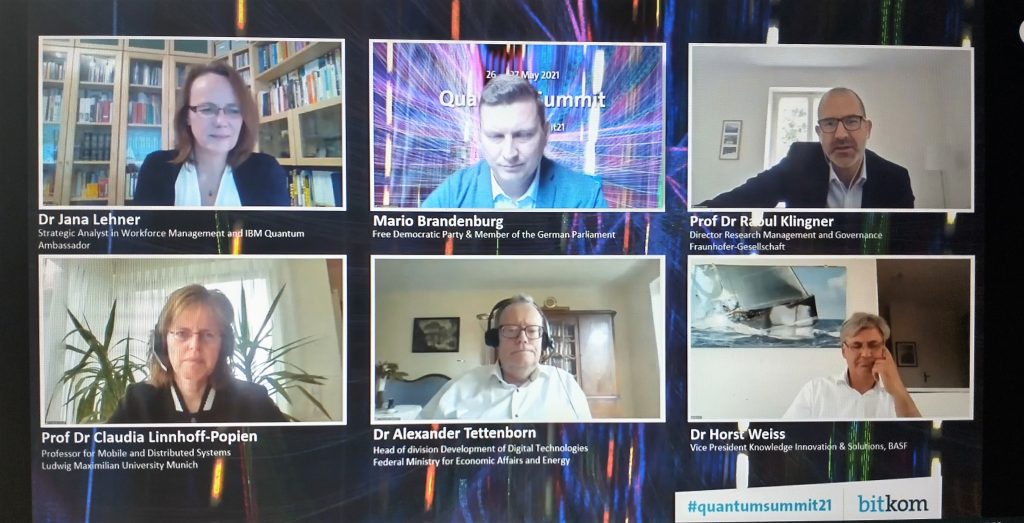
High hopes on fast pace of developments and barrier-free access to the technology
The speakers expressed different wishes about the speed of developments in Germany and agreed that the access to the technology should be as low-threshold and barrier free as possible. All participants were enthusiastic about quantum computing as a crucial future technology. The conference devoted two days exclusively to the topic of quantum technologies, illustrating how, after years of research, the topic has arrived in industry.
In Germany, there are many co-existing initiatives in research and industry that have excellent know-how about quantum computing and are increasingly applying the knowledge to applications. At the Institute of Computer Science at Ludwig-Maximilians-Universität (LMU) in Munich, research and programming has been carried out in the QAR Lab since 2016. The knowledge gained from years of research flows into considerations of real-world use cases with industry partners to program initial use cases on the computers.
The QAR-Lab has access to four quantum computers. Under the motto “Become Quantum ready,” the experts have set themselves the goal of supporting as many users as possible from science and industry in the field of quantum computing with their expertise.
Claudia Linnhoff-Popien concluded by saying that she is very proud of the PlanQK project and that the QAR Lab is among the top research institutes in the world: “We are also hosting a challenge at the chair until July with four industrial companies and 27 students who are programming use cases on different quantum computers. I think we’ve done a good job for many years already and we are in a good position for the future.”
More info: Quantum Summit 2021
International quantum technology expertise concentrated in one spot: Prof. Dr. Linnhoff-Popien speaker at IQT, New York
(May 19, 2021, New York) Quantum technologies have arrived in the business world. This was made clear by the panel presentations of top-class scientists and industrial users at the International Conference “Inside Quantum Technology” IQT in New York. The latter had invited computer science professor Claudia Linnhoff-Popien to give a talk on funding strategies from a German perspective. In total, more than 90 top quantum technology experts from around the world presented the latest research results and industry trends for four days. The virtual conference was broadcasted to registered visitors worldwide from May 17-20, 2021.
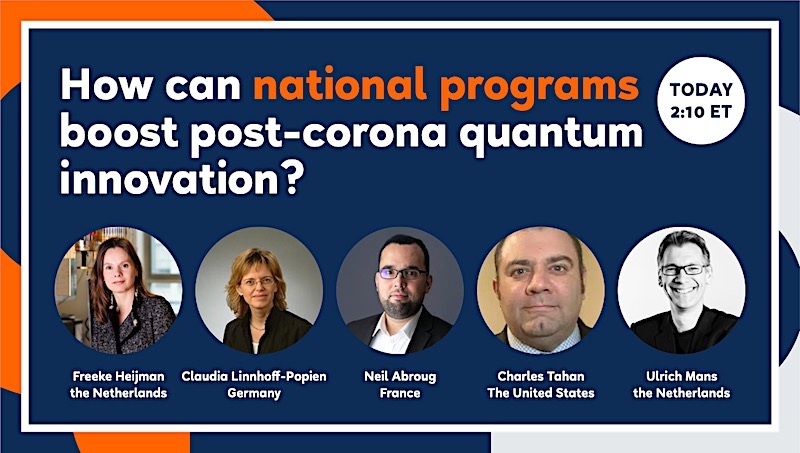 On May 19, Claudia Linnhoff-Popien explained the strategy and approach of the German Council of Experts in the international panel “How can national programs boost post-Corona quantum innovation?”. She illustrated the already existing application possibilities in the field of quantum computing on the part of software and programming.
On May 19, Claudia Linnhoff-Popien explained the strategy and approach of the German Council of Experts in the international panel “How can national programs boost post-Corona quantum innovation?”. She illustrated the already existing application possibilities in the field of quantum computing on the part of software and programming.
Prof. Dr. Claudia Linnhoff-Popien, Head of the Chair “Mobile and Distributed Systems” at the Institute of Computer Science at LMU Munich, is a member of the German Federal Government’s Expert Council on Quantum Computing. In the summer of 2020, the German government commissioned a 16-member council of experts from industry and science to develop a strategy and recommendations for future action. As a result, the experts council had handed over to the German government in January 2021 the “Roadmap Quantum Computing“, which finds its application in recent funding programs. Linnhoff-Popien had contributed key findings on the application of quantum computing on the part of IT and described them in the roadmap.
In the IQT panel presentation on the strategies of the four countries Netherlands, France, USA and Germany, the representatives explained the status quo in their countries in addition to Linnhoff’s presentation of the quantum computing strategy in Germany. The speakers in addition to Claudia Linnhoff-Popien were:
- Neil Abroug, National Coordinator (Quantum Strategy) representing France.
- Freeke Heijman, Co-Founder & Director (Quantum Delta) from the Netherlands
- Charles Tahan, Director (National Quantum Coordination Office) representing the USA.
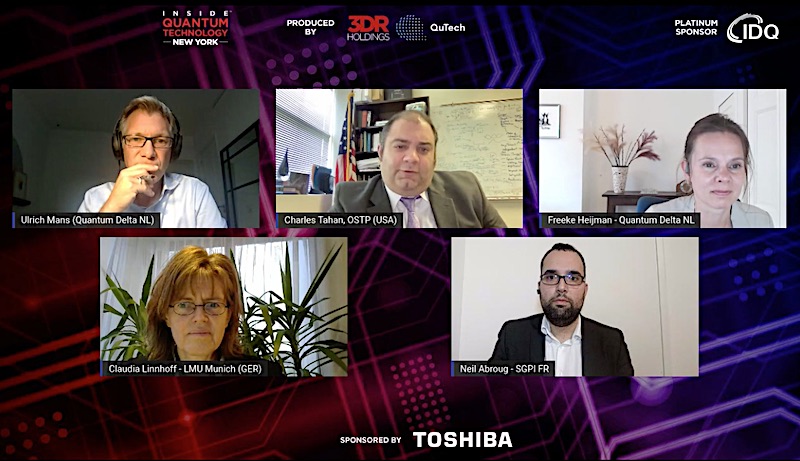 The US conference covered all aspects of quantum computing hardware and software, quantum networks, quantum sensing and quantum cryptography. Its goal is to present the latest applications to experts from all industries and to pool international knowledge.
The US conference covered all aspects of quantum computing hardware and software, quantum networks, quantum sensing and quantum cryptography. Its goal is to present the latest applications to experts from all industries and to pool international knowledge.
Read more on the Roadmap (German)
Read more on the Conference of Inside Quantum Technology New York

